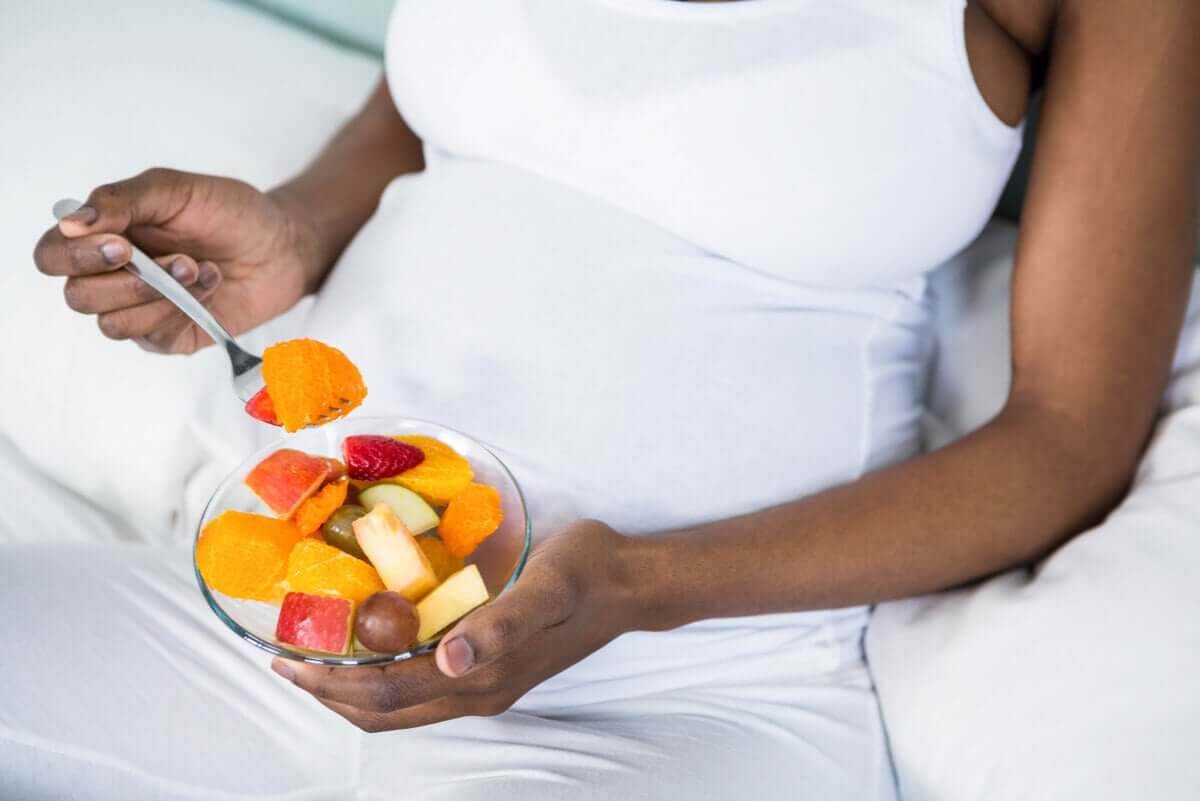Pregorexia: What Is it and What Causes It?


Written and verified by the doctor Leonardo Biolatto
Pregorexia is an eating disorder that can develop during pregnancy. This disorder, named by combining the words ‘pregnancy’ and ‘anorexia’, is becoming more and more common. But there’s still a lack of information available about it.
According to the data gathered by the National Spanish Institute of Statistics (Instituto Nacional de Estadística en España), around 290 women out of every 1000 that are of childbearing age don’t have a high enough body mass index. This seems to suggest that pregorexia may develop during pregnancy. If that’s the case, the pregnant person will have constant worries about their weight and body image.
What does pregorexia consist of?
Pregorexia, as we’ve mentioned, is an eating disorder that develops during pregnancy. It’s based on the fear of gaining weight at each stage. Those suffering want to maintain or even reduce their weight during pregnancy, and, as such, adopt certain behavior to do so.
For example, they frequently exercise to an extreme, reduce their food intake, or make themselves vomit, in addition to obsessively counting calories or skipping meals.
This disorder most commonly develops during the second trimester. This is partly due to the fact many people lose weight in the first trimester from morning sickness and vomiting, which can lead to confusion.
During pregnancy, weight gain is expected. In fact, specialists have stated that the ideal weight to gain can be up to 26.5 pounds, but this is dependent on the person’s BMI before pregnancy. However, this behavior can affect healthy weight gain and, in turn, put the baby at risk.

Gaining weight during pregnancy is expected and is healthy to a certain point, as long as it’s within the guidelines.
What causes pregorexia?
According to the book Health and Care During Development (Salud y cuidados durante el desarrollo), pregorexia usually develops in those that have a history of anorexia, or in those that have suffered any other eating disorder, like bulimia.
However, this illness can also develop in people without any history of an eating disorder. In a study carried out by the University of Jaen, researchers confirmed that there are other factors that are commonly associated with pregorexia. Some of those factors are:
- Low self-esteem or issues with feeling insecure: in fact, anxiety and depression are also related to pregorexia.
- If the pregnancy wasn’t planned or if there are doubts about being a suitable parent.
- A bad relationship or a lack of support from the partner.
However, societal beauty standards is the most obvious influence. Social media, magazines, and public adverts all promote a misinformed idea of what the perfect body is. Many people believe that being thin equals beauty.
As such, it has become more and more common for people to obsess with their weight and being thin, causing many people to try to adhere to these unrealistic standards even when they’re pregnant.
You may also be interested in: Dangerous Diets and Their Warning Signs
Risks of pregorexia
The development of the baby depends on the health and nutrition of the person carrying it. When the amount of food they eat or their weight isn’t sufficient, it doesn’t only put their own life at risk, but it can also have very negative effects on the fetus.
Pregorexia can cause anemia, which is associated with endometriosis and respiratory infections. At the same time, it also increases the risk of the person suffering postpartum depression after birth.
This disorder can lead to miscarriages or a higher risk of premature birth, if developed during pregnancy. The baby may also be harmed as the risk of hypoglycemia, infections, or even death is higher.
According to a study published in 2014, some of those affected by pregorexia have had to stop breastfeeding, because they simply can’t produce enough milk.
How to fight this problem
To fight this disorder, it’s key to spot it early on. During any pregnancy, there are strict guidelines that a pregnant woman must follow; but with the added complication of a potential risk, there are even more.
Tracking weight during pregnancy can help. It’s important that the person carrying understands that gaining weight is simply a normal part of pregnancy. It may also help them to calculate their ideal weight, and try to avoid fearing the inevitable weight gain.
If the pregnant person shows signs of pregorexia, then personalized psychological therapy can help. The gynecologist also must ensure that the baby isn’t at risk. Although there are no specific medications available, in some cases doctors may prescribe food supplements.

Being conscious of having a healthy diet during pregnancy is essential.
Psychological support is key
Pregorexia is an eating disorder that can develop during pregnancy; the person carrying the baby intensely fears weight gain and in turn develops certain habits that can put the baby at risk. It’s important to spot it early on and offer personalized psychological therapy to the person affected.
All cited sources were thoroughly reviewed by our team to ensure their quality, reliability, currency, and validity. The bibliography of this article was considered reliable and of academic or scientific accuracy.
- The pregorexia – anorexia during the pregnancy | Mandera | Journal of Education, Health and Sport. (n.d.). Retrieved August 29, 2020, from http://www.ojs.ukw.edu.pl/index.php/johs/article/view/6900
- Amanda, M., Anna, P., Ewa Magdalena, S., Aleksander, C., Paulina, K., & Maciej, M. (2019). eISSN 2391-8306 The journal has had 7 points in Ministry of Science and Higher Education parametric evaluation. Journal of Education, 9(5), 2391–8306. https://doi.org/10.5281/zenodo.2718477
- Mathieu, J. (2009). What Is Pregorexia? Journal of the American Dietetic Association, 109(6), 976–979. https://doi.org/10.1016/j.jada.2009.04.021
- Watson, H. J., Torgersen, L., Zerwas, S., Reichborn-Kjennerud, T., Knoph, C., Stoltenberg, C., … Bulik, C. M. (2014). Eating disorders, pregnancy, and the postpartum period: Findings from the Norwegian mother and child cohort study (MoBa). Norsk Epidemiologi, 24(1–2), 51–62. https://doi.org/10.5324/nje.v24i1-2.1758
- Trabajos Academicos de la Universidad de Jaen: Influencia de los Trastornos de la Conducta Alimentaria durante el embarazo: una revisión de la literatura. (n.d.). Retrieved August 29, 2020, from http://tauja.ujaen.es/handle/10953.1/6586
- Mróz, Michalina Wiktoria, and Emilia Korek. “Review of non-specific eating disorders.” Neuropsychiatria i Neuropsychologia 15.1-2 (2020): 42.
- Ramírez, Diana Leticia Cervantes, et al. “Prevalencia de obesidad y ganancia de peso en mujeres embarazadas.” Atención Familiar 26.2 (2019): 43-47.
- Vila Candel, Rafael, et al. “¿ Cuál es el mejor indicador antropométrico para el control del embarazo.” Nutr Clín Diet Hosp 36.3 (2016): 87-96.
This text is provided for informational purposes only and does not replace consultation with a professional. If in doubt, consult your specialist.








